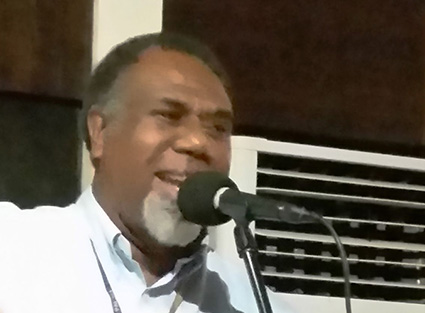
Bernadette Carreon
GUAM (Guam Daily Post/Pacific Media Watch): Moses Stevens’ childhood dream was to become either a mechanic or a banker; he later discovered that journalism would be his lifetime career. Stevens’ career in journalism started when he joined Radio Vanuatu on January 7, 1985 — almost five years after Vanuatu became independent from Britain and France on July 30, 1980. Radio Vanuatu was then a component of the prime minister’s Media Services Department, which was also running the Vanuatu Weekly newspaper. Stevens was elected president of the Pacific Islands News Association in 2009. He was in Palau last week for the Pacific Media Summit.
Q & A with PINA president Moses Stevens:
What are the challenges you face as the head of a big Pacific media news association?
I was elected into the position basically to keep the PINA family from breaking up. PINA is based in Suva, Fiji. At that time, a military government was in office and their relationship with other regional governments was not in their normal state. The media in Fiji was being suppressed and practitioners were being targeted. I was pressured to relocate the PINA secretariat out of Suva as our traditional donor partners were pulling out and withholding funds that we were using for our training programs. Despite the pressures, I had stood fast on the resolutions of the 2007 Media Summit held in Honiara, Solomon Islands, that PINA would remain in Suva, and that the PINA leadership must engage in dialogue with the Fiji government.
I was part of the PINA board that was elected in Honiara under the presidency of Joseph Ealedona of Papua New Guinea. We had met with then Prime Minister Frank Bainimarama and discussed the media issues in his country. When I became president in 2009, I maintained our position that we were not running away. We have stayed on and continued to engage. I had refused to allow PINA to be used as a political propaganda tool by any country that was on bad terms with Fiji.
I had maintained that we’re not a political organisation, and we will maintain our focus on engaging and dialoguing with relevant people as the way forward in restoring mutual trust between the Fiji government and the Fiji media. While we understand the international perspective on media freedom issues in Fiji then and now, we maintain that the sovereignty and integrity of each nation must be respected at all times.
How are members of the media received in Vanuatu?
It was a major step forward for us. I believe our leadership in the regional media organisation has helped our leaders and people to understand and begin to appreciate the role of the media in regards to freedom of expression and right to know and access to information.
In this digital age, do you think people still value traditional journalism?
We are racing against high speed communication technologies with social media platforms and forums available through even handsets such as mobile phones. The journalists’ code of ethics come under challenge as people with no media know-how are taking pictures and posting online comments without understanding the impact of the information that they are publishing in the platforms that are accessible to millions. The journalists can only be encouraged to get the facts and verify every report they hear and read on Facebook and other social media. In a positive way, the social media produces a lot of potential leads and news materials. It is the responsibility of the media industry to help in the establishment of appropriate information management in our countries.
Was it your first time to visit Palau?
Yes, it was my first time to come to Palau. The country is so beautiful, the people are so warmhearted, and I felt so at home in Palau.
As a journalist, whom would you want to interview?
There are so many, but I would chose the President of Palau because of what I have been told about his proactive attitude toward the media, and how he uses the media to address his people on a regular basis. I wish to hear more of the laws in his country regarding media. Information is power, but without proper and appropriate legislation in place, people are being deprived of their right to know and right to access information.
What do you consider the most memorable — and challenging— story you’ve ever covered?
I would say my favorite report was my interview with our first Prime Minister Father Walter Lini, in Tarawa, Kiribati when he was attending the 1989 Pacific Islands Forum Leaders meeting. Lini had just done a visit to the pro-independence leaders in New Caledonia and French Polynesia before going to the Tarawa PIF meeting. What he said (during the interview) was relevant to my local audience, having gone through the process of decolonisation and striving to build our nation by ourselves and within our means and the support we could get from the international community.
The most challenging for me was when I was sent to travel with our then prime minister to the 1992 Earth Summit in Rio de Janeiro, Brazil. It was my first time to cover such a massive convergence of world leaders.
This work is licensed under a Creative Commons Attribution-NonCommercial 3




